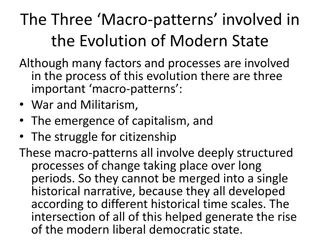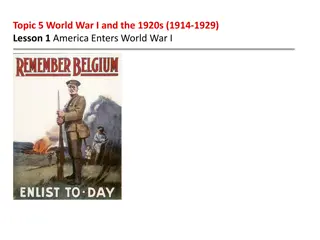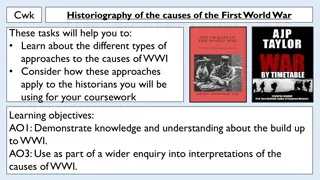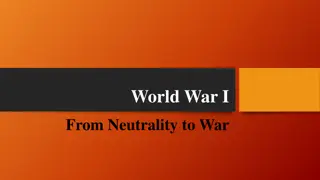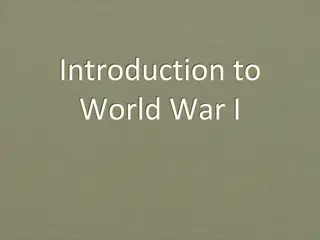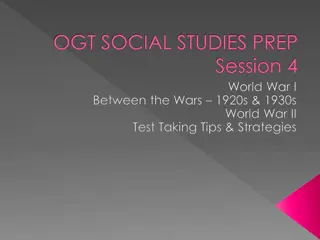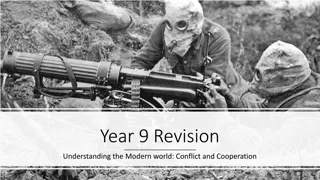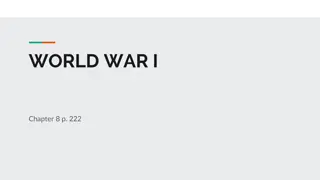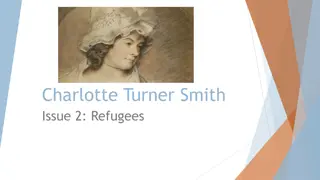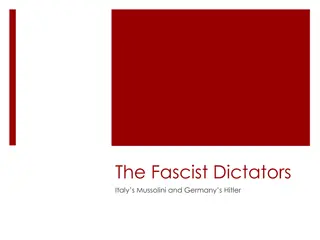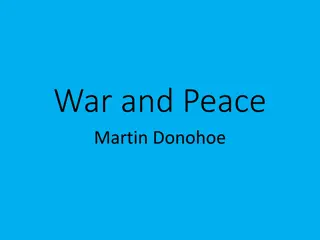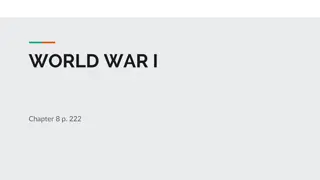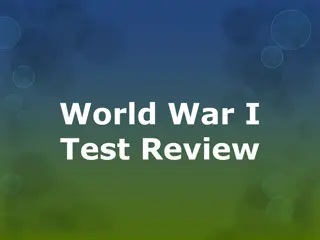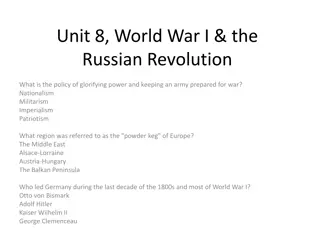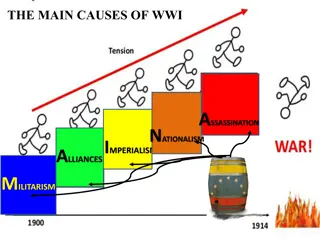Evolution of Modern State: Three Macro-Patterns Explored
The evolution of the modern state is influenced by three key macro-patterns: War and Militarism, Emergence of Capitalism, and Struggle for Citizenship. These patterns involve deep processes of change over long periods, contributing to the development of modern liberal democratic states. War and Mili
0 views • 13 slides
America's Entry into World War I: Causes and Impacts
World War I and the 1920s witnessed America's transition from neutrality to active involvement in the war. Factors such as nationalism, militarism, imperialism, and alliances led to the conflict. The impact of technological innovations resulted in stalemate on the Western Front, leading to significa
0 views • 11 slides
Approaches to the Causes of World War I: Historiography Overview
Explore various historical perspectives on the origins of World War I, from the blame placed on Germany in the Treaty of Versailles to the revisionist and anti-revisionist interpretations that emerged post-World War II. Delve into differing views on nationalism, imperialism, militarism, and alliance
0 views • 13 slides
Cultural Exchanges Between Japan and Tang China: A Historical Perspective
Explore the rich history of cultural exchanges between Japan and Tang China, from diplomatic relations to technological advancements. Discover the influence of Chinese culture on Japan, the heyday of cultural exchanges, and the impact of militarism on the relationship. Witness the evolution of frien
0 views • 7 slides
World War I: Triggers and Ramifications
The causes of World War I, ranging from militarism and alliances to imperialism and nationalism, created a volatile environment in Europe. Nationalism led to heightened international rivalries, while militarism and an arms race added fuel to the fire. The quest for power, territory, and economic dom
0 views • 36 slides
Understanding Nationalism and Militarism in World War I
Explore the impact of nationalism and militarism in Europe during World War I through discussions on pride, alliances, and societal effects. Consider the dangers of excessive nationalism and how it led to conflict in the early 1900s.
0 views • 29 slides
Understanding the Impact of World War I on Global History
Delve into the multiple causes and effects of World War I, such as militarism, imperialism, nationalism, and alliances. Explore how the global scope of WWI shaped the 1920s and 1930s, leading up to World War II. Gain insights into key events and dynamics of this transformative period.
0 views • 97 slides
Understanding the Modern World: Conflict and Cooperation in Year 9 Revision
This revision material covers various aspects of conflicts and cooperation in the modern world, focusing on World War I and World War II. It discusses the causes of both wars, life changes during the wars, the rise of totalitarian governments, the Holocaust, British involvement in WWI, trench warfar
0 views • 10 slides
World War I: Causes and Early Battles
The outbreak of World War I was fueled by nationalism, imperialism, militarism, and alliances. The assassination of Archduke Francis Ferdinand sparked a chain reaction leading to widespread conflict in Europe. Early battles like the Battle of Marne showcased trench warfare. Land and sea battles ensu
0 views • 23 slides
Charlotte Turner Smith and the Political Landscape of the 1790s
Charlotte Turner Smith, in her works such as "The Emigrants" and "Desmond," navigates the turbulent political climate of the 1790s, blending male voices and political commentary. She engages in public debate, challenging societal norms and advocating for liberty and peace amidst gendered discourses
0 views • 18 slides
The Rise of Fascism in Italy: The Reign of Mussolini
Italy's post-World War 1 chaos paved the way for Mussolini's rise to power as a dictator. Using violence and intimidation, the Fascists dismantled democracy, centralized power, and promoted extreme nationalism and militarism. Despite promises of order and greatness, Mussolini's regime suppressed dis
0 views • 22 slides
The Evolution of Warfare: From Ancient Times to the Modern Era
Explore the historical progression of organized warfare, from the beginnings of large-scale conflicts and the development of weapons to the impact of militarism on society. Discover how warfare has evolved over millennia, leading to the complex landscape of 20th and 21st-century warfare. Delve into
0 views • 76 slides
Causes and Outbreak of World War I
Various factors such as nationalism, imperialism, militarism, and the assassination of Archduke Francis Ferdinand led to the outbreak of World War I. The tensions in Europe escalated as countries formed alliances and mobilized for war. The conflict resulted in early battles like the Battle of Marne
0 views • 23 slides
World War I Test Review and Historical Overview
Learn about the key terms and concepts related to World War I, including militarism, nationalism, neutrality, propaganda, espionage, and more. Explore the long-term causes of the war, the immediate trigger, the Central Powers and Allied Powers involved, as well as important events like the Zimmerman
0 views • 13 slides
World War I and the Treaty of Versailles: Key Events and Consequences
The policy of glorifying power and militarism, the tensions in the Balkan Peninsula, Germany's leadership, causes of the United States' entry into World War I, impact of unrestricted submarine warfare, transition to total war, the end of the war with an armistice, the Treaty of Versailles assigning
0 views • 10 slides
World War I: Causes, Timeline, and Impact
Learn about the main causes of WWI including alliances, imperialism, nationalism, militarism, and the assassination of Archduke Ferdinand. Discover how the war started, the involvement of different countries, trench warfare, sinking of the Lusitania, the impact on America, and the eventual entry of
0 views • 18 slides
